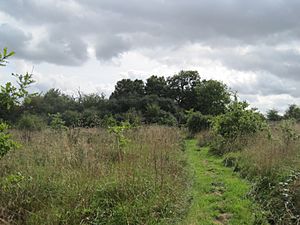Moat Mount Open Space facts for kids
Moat Mount Open Space is a huge park and nature reserve that covers 110 hectares (that's about 270 acres!) in Mill Hill, which is in the London Borough of Barnet. It's a special place because it's protected for its nature. Moat Mount is part of a bigger area called a "Site of Borough Importance for Nature Conservation," which means it's really important for wildlife. This larger area also includes places like Barnet Gate Wood and Scratchwood Countryside Park. While it's connected to these, Moat Mount is its own separate park. Most of Moat Mount is open for everyone to explore, but some parts, like Mote End Farm, are private. Both Moat Mount and its neighbor, Scratchwood, are officially recognized as a Local Nature Reserve.
Contents
What is Moat Mount Like?
Moat Mount is a big, hilly area where you can see amazing views from the top! The ground here is mostly made of something called London Clay. A large part of this park is open grassland, which is like a big field full of different wild flowers. These flowers attract lots of beautiful butterflies, making it a great spot for nature lovers.
The park also has a pond called Leg of Mutton Pond and several smaller woods, like Target Wood and Nut Wood. Moat Mount is also home to the Moat Mount Outdoor Centre and Campsite. This center offers many fun activities for local schools and youth groups, helping young people connect with nature. A small river called the Dollis Brook actually starts its journey right here, on Mote End Farm.
Who Owned Moat Mount Before?
Long ago, this land was owned by a person named Irwin Cox. He was a Conservative Member of Parliament (MP) for Harrow from 1899 to 1906. An MP is a person elected to represent an area in the country's parliament, helping to make laws and decisions.
How to Visit Moat Mount
There are several ways to get into Moat Mount. The main entrance is at the Moat Mount car park, which is on the southbound side of Barnet Way. This is a big road known as the A1. You can find it between Stirling Corner and Apex Corner.
You can also enter the reserve from the back of Mill Hill County High School, from Barnet Road (near Stirling Corner), or from Hendon Wood Lane. Two popular walking paths, the Dollis Valley Greenwalk and the London Loop, go through Moat Mount. The Dollis Valley Greenwalk even starts right at the car park! If you want to visit Scratchwood, which is across Barnet Way, you can use an underpass at Courtland Avenue to get there safely.
Bruno's Field: A Special Area
Bruno's Field is another important natural area, located south of Moat Mount between Worcester Crescent and Marsh Lane. It's also recognized as a "Site of Borough Importance for Nature Conservation."
In the mid-1800s, this field was part of a large estate called Highfield House. At that time, it belonged to Lady Raffles, who was the wife of Stamford Raffles. He was a famous person who founded Singapore! Today, most of Bruno's Field is used as pasture, which means it's where cattle from the Royal Veterinary College graze.
The field has different types of land, with a pond and small streams in wet, boggy areas. The grassy parts have many typical pasture plants. Some very old oak trees here show where field boundaries were way back in the 1700s! Bruno's Field is private land, so it's not open to the public.
Gallery






